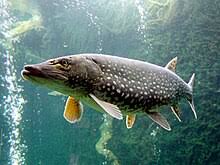Game Fish, are typically species that are pursued for sport rather than for food. They are known for their challenging catch and the excitement they provide anglers. The term “game fish” varies by region and can include freshwater and saltwater species. Some are highly regulated, requiring licenses or specific seasons for fishing, as they are often endangered or crucial to the ecosystem.
Popular Game Fish Species
- Bass:
- Largemouth Bass: A favorite among freshwater anglers, this species is known for its aggressive behavior and strong fight. It thrives in lakes, rivers, and ponds.
- Smallmouth Bass: Often found in cooler waters, smallmouths are celebrated for their acrobatics and spirited nature.
- Trout:
- Rainbow Trout: This colorful fish is popular in streams and lakes, offering a challenging catch and delicious taste.
- Brown Trout: Known for their wariness, brown trout require skillful techniques to catch, making them a favorite among experienced anglers.
- Pike and Musky:
- Northern Pike: With sharp teeth and a ferocious appetite, pike provide an exhilarating challenge for those fishing in freshwater.
- Muskellunge: Often referred to as “muskies,” these fish are elusive and highly sought after due to their size and difficulty to catch.
- Salmon:
- Species like Chinook and Coho are renowned for their powerful runs and acrobatic leaps. Salmon fishing is often done in rivers during spawning seasons, making it a thrilling experience.
- Tuna:
- Bluefin Tuna: Known for their size and strength, tuna fishing is a hallmark of sport fishing in saltwater environments. Catching a bluefin is a significant achievement for anglers.
- Marlin and Sailfish:
- These species are prized in saltwater fishing for their size and speed. They are known for their spectacular leaps and challenging fights, making them targets for big game anglers.
Tips for Successful Game Fishing
- Research Local Regulations: Always check local fishing regulations regarding seasons, size limits, and catch-and-release rules. Compliance ensures sustainable fishing practices.
- Choose the Right Equipment: Depending on the species you’re targeting, select appropriate rods, reels, and lines. Game fish often require specific tackle to handle their size and fighting ability.
- Master Fishing Techniques: Familiarize yourself with various fishing techniques, such as trolling, fly fishing, or casting. Each species may require different approaches for successful catches.
- Know the Habitats: Understanding where game fish are likely to be found can increase your chances of a successful outing. Look for structures like rocks, logs, or underwater vegetation where fish tend to congregate.
- Use the Right Bait: Depending on the species, using live bait, artificial lures, or flies can make a significant difference. Research what works best for the fish you’re targeting.
- Practice Patience and Observation: Fishing often requires patience. Observing the water for signs of fish activity, such as jumping or feeding, can help determine the best spots to cast.
- Respect the Environment: Practice ethical fishing by following catch-and-release guidelines and minimizing your impact on the ecosystem. Clean up after yourself and leave natural areas better than you found them.
Conclusion
Game fish represent some of the most exciting and rewarding challenges in the fishing world. Whether you’re a seasoned angler or a beginner looking to explore this thrilling sport, understanding the species, techniques, and ethical practices involved in game fishing can enhance your experience. With the right knowledge and respect for nature, fishing for game fish can provide unforgettable memories and a deeper connection to the great outdoors. So grab your gear, head to the water, and enjoy the exhilarating pursuit of game fish.




